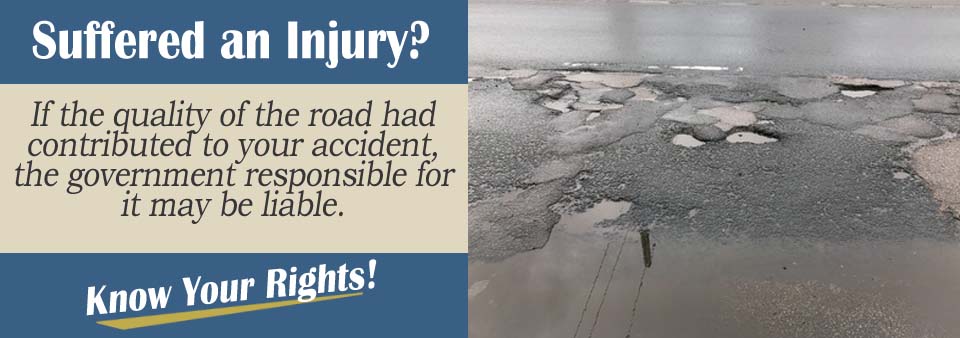No accident happens in a bubble. Circumstances are not always so black and white as to fault and what caused the accident. This fact is even more true when it comes to road conditions and car accidents. Unless you live in an area with perfect road conditions, it is likely that poor road conditions play some part in your accident, whether these be pot holes, road damage, poor design or missing guardrails.
However, how do these poor road conditions affect your ability to pursue damages from another driver?
We have asked attorney Alaina Sullivan about how this may change a personal injury case. Here is what she had to say:
The Responsible Driver
The question arises whether the other driver who hit you was being responsible in light of the road conditions or if that person was being reckless, and the road conditions merely increased the damage. If that person was deemed to be driving recklessly, then you can certainly still pursue damages from that driver.
However, be aware that the other driver or his insurance company will likely try to fight you on the level of responsibility the driver had, given the bad road conditions.
The Typical Reasonable Driver
Courts will look at the situation as a whole and try to determine how a reasonable driver would handle those specific driving circumstances. No driver is expected to avoid every pot hole on the road, but if the driver is going 90 mph and hits a pot hole, resulting in a car accident, it could certainly be argued that no reasonable, responsible driver would have driven in that manner in the same or similar situation.
Was There Warning of the Danger?
Granted, the government cannot repair a road as soon as it is damaged or a road condition arises. However, if something is significant and has been brought to the municipality’s attention, they do have a duty to warn drivers.
Signs, flares, construction cones, and barriers are a few ways warnings can be put out for road conditions. If, after seeing these warnings, a driver continues to be reckless and causes an accident, the liability for this accident and resulting damage is normally passed onto the driver.
Who Is Responsible?
It depends on the road involved. States, counties, and cities have liability over different roads, depending on where they are and the type of road. You need to know the proper party to sue before seeking any damages from a governmental entity from an accident.
Each state also has different laws regarding how long you have in order to bring a law suit and the different type of road conditions that can be considered negligent if the governmental entity does not maintain the roadway.
Further, to seek any type of compensation from anyone other than the other driver, you must show that the road condition actually caused the damage to you or your car. You must also show that you were driving cautiously given the circumstances.
Like I said, nothing is black and white when it comes to fault in a car accident. It is best to consult with an attorney before you pursue anything to discuss your options in the specific circumstances.
Contact an Attorney Today
An attorney taking personal injury cases can give you a clear picture of how viable your case is, and how you can best pursue it. They can fight for you and help you collect the information you need to reach a fair resolution to your case, whether it's in court or through a settlement.
